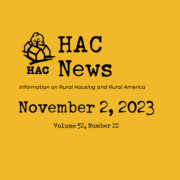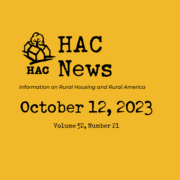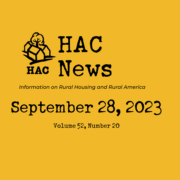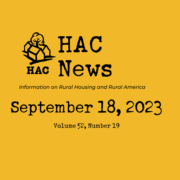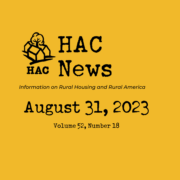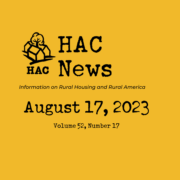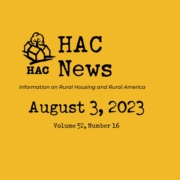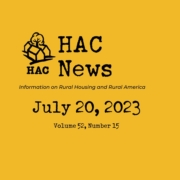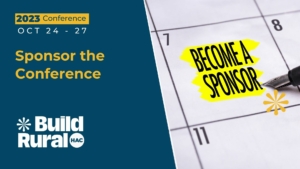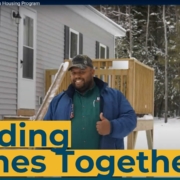HAC News: November 2, 2023
Vol. 52, No. 22
TOP STORIES
Second continuing resolution needed by November 17
The federal government is currently funded by a continuing resolution that ends November 17, and a second CR will be necessary to keep programs running while full-year appropriations bills are prepared. Both the House and Senate are trying to move forward on enacting FY24 funding bills, but progress is slow and most of the bills, including those for USDA and HUD, differ widely between the two chambers. On November 1, the Senate passed a “minibus“ that includes funding for USDA, Transportation-HUD, and Military Construction-VA. The House may vote November 2 or 3 on some of its funding bills, including Transportation-HUD. In September the House voted on, but did not pass, its USDA appropriations bill. President Biden will veto the House THUD and USDA bills if passed in their current forms.
Final Community Reinvestment Act rule released
The federal banking regulatory agencies – the Federal Reserve Board, FDIC, and Office of the Comptroller of the Currency – have issued a final revised Community Reinvestment Act rule, most of which will take effect on April 21, 2024. The rule modernizes the CRA evaluation framework in several ways that will benefit rural areas. Two modifications to the reliance on facility-based assessment areas should increase community development activities in rural areas: the rule uses counties rather than census tracts as the defining geography for facility-based assessment areas, and it enhances CRA credit for bank community development activities outside of facility-based assessment areas. For large banks, it gives equal weight to community development activities and retail lending. Community development activities in persistent poverty counties, Native lands, and colonias, all of which are disproportionately rural, are designated as impact factors. And it emphasizes “responsiveness to community need” and other qualitative factors as well as metrics.
HAC’s decennial Taking Stock report analyzes rural America
Taking Stock: Rural People, Rural Places, Rural Housing, released at the 2023 National Rural Housing Conference, is the fifth in a series of decennial reports covering social, economic, and housing trends. For the first time the report includes interactive, digital, and new media resources. Chapters cover “The New (and Evolving) Rural America,” “Rural People and Places,” “The Rural Economy,” and “Rural Housing.”
President Biden launches “Investing in Rural America” events
On November 1, President Biden launched a two-week Investing in Rural America Event Series. Cabinet members including Secretary of Agriculture Tom Vilsack, as well as other administration officials, will visit a variety of rural places to announce funding awards in economic development (including housing), infrastructure (including community facilities), high-speed internet, agriculture, and renewable energy.
National Rural Housing Conference convenes stakeholders to “Build Rural”
Nearly 700 rural housing practitioners and policymakers came together in Washington, DC on October 24-27 for the 2023 National Rural Housing Conference. Recordings of the plenary sessions are available online, including a discussion with Senators Tina Smith (D-MN) and Mike Rounds (R-SD), a presentation by Professor Kathryn Edin on the injustice of place, an overview of HAC’s new Taking Stock report, and more. Anyone who registered for the conference can access workshop materials and more through the conference app or by logging into the Attendee Hub. HAC thanks our many sponsors, scholarship contributors, and partners for helping to make the event possible.
November is National Native American Heritage Month
November is National Veterans and Military Families Month
RuralSTAT
In 1790, nearly 95% of the U.S. population, over 3.7 million people, lived in rural places. By 2020 the rural population grew to more than 60 million people but accounted for just 18.1% of all U.S. residents. Source: HAC tabulations of historic Census Bureau data.
OPPORTUNITIES
HUD offers funding for Section 811 housing for persons with disabilities
Nonprofits and limited partnerships can apply for capital advances and rental assistance under the Section 811 Supportive Housing for Persons with Disabilities Program, which supports the development of, and ongoing rental assistance for, permanent supportive rental housing for very low-income persons with disabilities. The deadline for both capital advances and Project Rental Assistance Contracts is February 12. For more information, contact HUD staff, 811CAPAdvance@hud.gov or 811PRANOFO@hud.gov.
ROSS service coordinator funds available
HUD’s Resident Opportunity and Self-Sufficiency Service Coordinator Program funds service coordinators for public and Indian housing. Nonprofits, PHAs, Tribal governments and Tribal housing entities, resident associations, and some owners of multifamily housing are eligible to apply by December 18. For more information, contact HUD staff, 202-402-3624, ROSS-PIH@hud.gov.
Government entities can apply for hazard mitigation funds
FEMA’s Building Resilient Infrastructure and Communities (BRIC) grant program provides funds to states, U.S. territories, federally recognized Tribal governments, and local governments for hazard mitigation activities including capacity building, hazard mitigation projects, and management costs. Apply by February 29. For more information, contact FEMA staff, 1-877-585-3242, femago@fema.dhs.gov.
Initiative will help rural communities plan to address substance use issues
Reaching Rural: Advancing Collaborative Solutions, a one-year initiative sponsored by a group of federal agencies, will help individuals or cross-sector teams develop plans to address substance use issues in their communities. The planning fellowships do not offer funding but include an opportunity at the end of the year to apply for grants of up to $100,000 to launch projects. An informational webinar will take place on November 14 and applications are due December 15. For more information, email COSSUP@iir.com.
REGULATIONS AND FEDERAL AGENCIES
Community Facilities program input requested
USDA Rural Development is considering changes to its Community Facilities direct loan and grant programs, including expanded eligibility for housing funding. Comments can be presented at an online listening session on November 7 or submitted in writing by December 8. For more information, contact Surabhi Dabir, USDA, 202-568-9315.
HUD has new Buy America info page and webinars, OMB issues new memo
A new Build America, Buy America Act page was recently launched on the HUD Exchange to provide resources for entities receiving funding from HUD’s Community Planning and Development programs, which include HOME, CDBG, SHOP, Continuum of Care, Veterans Housing, and more. Three quick guides are offered, and more are planned in both English and Spanish. Submit questions on CPD topics here. Also, several webinars are scheduled, including one on November 2.
A more general BABA section on HUD’s website provides information such as what types of assistance are not covered by the Buy America preference and an illustration of HUD’s phased implementation schedule.
The Office of Management and Budget, which oversees BABA for all federal agencies, issued a new implementation guidance memorandum on October 25, M-24-02, replacing M-22-11 issued in April 2022. The new memo aligns with OMB’s recent final rule on the subject.
Use of CDBG funds for housing, including manufactured housing, described
HUD Notice CPD-23-10, Use of CDBG Funds in Support of Housing, describes how Community Development Block Grant grantees can use this funding to support and promote the development of decent, accessible, equitable, and affordable housing in their communities. It includes changes relating to manufactured housing, and those provisions will be the subject of a November 8 webinar.
HUD considers allowing agencies to opt out of in-person housing counseling
A proposed change in HUD’s housing counseling regulations would allow counseling agencies to provide their services virtually rather than in-person. Agencies that choose not to provide in-person services would be required to refer clients to local providers that provide such services, when requested. Comments are due December 26. For more information, contact David Valdez, HUD, 713-718-3178.
Multifamily insurance changes proposed by USDA
Revisions to the requirements on multifamily housing insurance coverage and deductibles are intended to bring the 2004 regulations in line with current affordable housing industry standards. Comments are due December 26. For more information, contact Michael Resnik, USDA, 202-430-3114.
Broadband expansion in HUD-assisted communities planned, comments requested
HUD plans to expand its ConnectHomeUSA initiative to between 50 and 100 new communities to further the collaborative efforts by government, industry, and nonprofits to accelerate broadband internet adoption and use in HUD-assisted homes. Comments are due December 18. HUD will accept applications between December 19, 2023 and February 15, 2024. For more information, contact Dina Lehmann-Kim, HUD, 202-402-2430.
Duty to Serve and other housing activities evaluated
A new Federal Housing Finance Agency report describes Fannie Mae’s and Freddie Mac’s affordable housing activities during 2022. Both entities met their single-family and multifamily affordable housing goals. Under the Duty to Serve requirements, both received “low satisfactory” ratings for affordable housing preservation activities and “high satisfactory” ratings for rural housing activities. For manufactured housing, Fannie Mae’s performance was rated “low satisfactory” and Freddie Mac’s was rated “high satisfactory.”
EVENTS
Monthly virtual trainings set for Section 502 guarantee program
Free virtual trainings on topics related to USDA’s Section 502 guarantee program will begin on November 8 with Program Overview: 101. Future sessions are planned through September 2024. In-person training will also be offered in spring 2024.
Manufactured housing webinar series begins
HUD’s four-part webinar series aims to help increase understanding of how manufactured housing can be a sustainable solution to meeting a community’s affordable housing needs. Introduction to Manufactured Housing was held November 1. Overview of the Updated CPD Notice on CDBG Housing Activities is set for November 8. Future sessions will include “Using Federal Funding Sources to Develop Manufactured Housing” and “Manufactured Housing and Tribal Communities.” For more information, contact the series registrar, info@capitalaccessinc.com.
HUD session to cover cash aid and housing
Cash Assistance and Housing, a hybrid event to be held in Washington, DC and online on November 16, will examine guaranteed income programs, which provide direct payments to local participants, and their impact on housing opportunities in Philadelphia and Denver.
PUBLICATIONS AND MEDIA
Policies and biases left the rural economy behind, research concludes
The booming knowledge economy of the last four decades has contributed to the increasing disparity in opportunity between rural and nonrural places, according to an analysis by the Center on Rural Innovation. The Equity of Economic Opportunity in Rural America argues that policies and biases have concentrated knowledge economy resources and investment in nonrural places, making it more difficult for rural areas to compete. Investing in rural knowledge economies is the best way to address these root causes and help rural economies catch up, the report concludes.
Study suggests changes for HUD program addressing homelessness after disasters
Plugging the Gaps: Recommendations for HUD’s RUSH Program, published by the National Low Income Housing Coalition and the National Housing Law Project, reports on HUD’s new Rapid Unsheltered Survivor Housing (RUSH) program, which is intended to help people experiencing or at risk of homelessness in disaster-affected areas. Its recommendations include ensuring equity in allocation decisions, providing RUSH funds up front instead of by reimbursement, and imposing requirements for timely use of funds.
Analysis considers why census found huge increase in Native Americans
The 2020 census counted 9.6 million people with fully or partly Native American heritage, compared to 5.2 million in 2010. A Washington Post data analysis, The Native American Population Exploded, the Census Shows. Here’s Why, examines the reason for the jump and concludes it was not due to procreation or to immigration of Natives from other countries, but instead to the way the race question was phrased on the census form and, even more importantly, how responses were coded.
HAC
HAC is hiring
- The Rental Housing Development and Preservation – Housing Specialist will provide technical assistance support to nonprofit organizations involved in multifamily housing programs, with a specific focus on USDA 515 and HUD rural housing programs. This position is remote work eligible.
- The Rental Housing Development and Preservation Housing Specialist – Senior Level Position is a senior-level role that combines expertise in multifamily housing programs, specifically focusing on USDA 515 and HUD rural housing programs, with the responsibility of providing technical assistance, with a particular focus on transfers of USDA 515 properties. This position is remote work eligible.
- The Senior Accountant is responsible for applying technical and leadership skills to guide accounting practices and recording of transactions. This position is hybrid, based in Washington, DC.
- The Executive Assistant supports the work of HAC’s Chief Executive Officer, senior leadership, and board of directors. The position is a blend of administrative work and project assignments. This position is based in Washington, DC.
Need capital for your affordable housing project?
HAC’s loan fund provides low interest rate loans to support single- and multifamily affordable housing projects for low-income rural residents throughout the U.S. and territories. Capital is available for all types of affordable and mixed-income housing projects, including preservation, new development, farmworker, senior and veteran housing. HAC loan funds can be used for pre-development, site acquisition, site development, construction/rehabilitation and permanent financing. Contact HAC’s loan fund staff at hacloanfund@ruralhome.org, 202-842-8600.
Please note: HAC is not able to offer loans to individuals or families. Borrowers must be nonprofit or for-profit organizations or government entities (including tribes).
Want to reprint a HAC News item?
Please credit the HAC News and provide a link to HAC’s website. Thank you!

